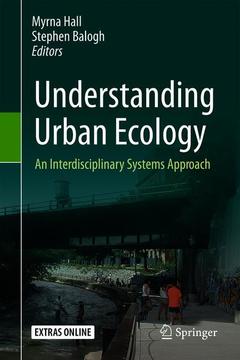Understanding Urban Ecology, 1st ed. 2019 An Interdisciplinary Systems Approach
Langue : Anglais

Over half of the world?s population now lives in urban areas. Few who live in cities understand that cities, too, are ecosystems, as beholden to the laws and principles of ecology as are natural ecosystems. Understanding Urban Ecology: An Interdisciplinary Systems Approach introduces students at the college undergraduate level, or those in advanced-standing college credit high school courses, to cities as ecosystems. For graduate students it provides an overview and rich literature base. Urban planners, educators, and decision makers can use this book to help in designing a more sustainable or ?green? future. The authors use a systems approach to explore the complexity and interactions of different components of a city?s ecology with an emphasis on the energy and materials required to maintain such concentrated centers of human activity and consumption. The book is written by seventeen specialized contributors and includes ten accompanying detailed field exercises to promote hands-on experience, observation, and quantification of urban ecosystem structure and function.
The chapters describe one by one the different subsystems of the urban environment, their individual components and functions, and the interactions among them that create the social-ecological environments in which we live. The book?s emphasis on social-ecological metabolism provides students with the knowledge and methods needed to evaluate proposed policies for urban sustainability in terms of ecosystem capacity, potential positive and negative feedbacks, the laws of thermo-dynamics, and socio-cultural perception and adaptability.Preface. 1. What Is Urban Ecology and Why Should We Study It?.- 2. Urban Ecology from a Biophysical and Systems Perspective.- 3. Social Processes, Urban Ecosystems and Sustainability.- 4. Scale and Metabolism in Ancient Cities.- 5. Economy and Development in Modern Cities.- 6. The Urban Hydrological System.- 7. The Climate System.- 8. The Atmospheric System: Air Quality and Greenhouse Gases.- 9. Nutrient Biogeochemistry of Urban Systems.- 10. Material Cycles.- 11. The Biological System: Plants in the Urban Environment.- 12. The Biological System: Urban Wildlife, Adaptation and Evolution; Urbanization as a Driver of Contemporary Evolution in Gray Squirrels (Sciurus carolinensis).- 13. Environmental Justice in the Urban Environment.- 14. Urban Food Systems.- 15. 15. Urban Design Toward More Holistic Systems: Improving Discipline Integration and Sustainability Evaluation.- 16. The Epilogue.
Myrna H. P. Hall (Ed.) is Professor Emerita of Environmental Studies at the State University of New York, College of Environmental Science in Syracuse, NY, where she helped establish the College’s Urban Initiative in 2001, was Director of the SUNY ESF Center for the Urban Environment, coordinated the College’s Urban Environmental Science Minor, and worked with an interdisciplinary team of faculty members to design an urban ecology course which she taught for 12 years before retiring. As a spatial ecologist, her research and publications have focused on environmental alteration from human activities, including urban/suburban sprawl effects on water quality in the New York City Catskill-Delaware watersheds, ecosystem impacts of glacier loss in Glacier National Park, and the impact of alternative urban green infrastructure implementation on urban energy budgets. She has done extensive land use change modeling inBrazil, Mexico, Bolivia, and Belize to estimate carbon benefits of avoided deforestation. Her interests span urban ecology and architecture, geographic information systems, and land change modeling.
Stephen Balogh earned his doctorate from SUNY College of Environmental Science and Forestry (ESF). He currently works as a postdoctoral researcher at the US EPA Office of Research and Development in the Atlantic Ecology Division. He is an environmental scientist who studies communities and their connections to the environment across global, regional and local scales – including nutrient issues, ecosystem services, energy and material flows, and restoration. He has collaborated with other scientists, academics, and stakeholders on a broad range of interdisciplinary research. These projects range in scale from regional optimization of nitrogen removal interventions in Cape Cod to neighborhood scale analyses of ecosystem services and material ande
Includes 10 detailed field exercises to promote hands on experience, observation, and quantification of urban ecosystem structure and function Provides an overview for graduate students and a rich literature base on the topic Written by seventeen specialists
Date de parution : 04-2019
Ouvrage de 360 p.
15.5x23.5 cm
Thèmes d’Understanding Urban Ecology :
© 2024 LAVOISIER S.A.S.
Ces ouvrages sont susceptibles de vous intéresser

Urban EcologyAn Introduction 68,67 €


